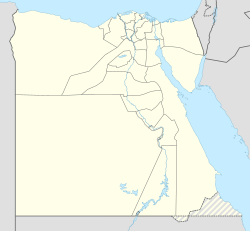Thinis
Thinis or This (Egyptian: Tjenu) was the capital city of the first dynasties of ancient Egypt. The actual site of Thinis has not yet been discovered. Ancient writers, such as Manetho, said it was the centre of the Thinite Confederacy. Their leader Menes (or Narmer), united Egypt and was its first pharaoh. In the Third Dynasty the capital was moved to Memphis. This meant that Thinis was no longer important. It still played a role in administration becauset was close to border of the competing Heracleopolitan and Theban dynasties of the First Intermediate Period. It was also near oases of military importance, during the Old and New Kingdoms. Thinis lost its position as a regional administrative centre by the Roman period.
Thinis
Tjenu | |
|---|---|
Approximate location (at Girga) in modern Egypt | |
| Coordinates: 26°20′N 31°54′E / 26.333°N 31.900°E | |
| Country | Ancient Egypt |
| Nome | Nome VIII of Upper Egypt |
| Earliest evidence | c. 4000 BCE |
| Government | |
| • Type | Nomarch (Old Kingdom) Mayor (New Kingdom) |
Due to its ancient heritage, Thinis remained a significant religious centre. It was the home to the tomb and mummy of the local god. In ancient Egyptian religious cosmology, as seen (for example) in the Book of the Dead, Thinis played a role as a mythical place in heaven.[1]
The exact site of Thinis is unknown. Historians believe its was near ancient Abydos and modern Girga.[2][3][4]
References
change- Gardiner, Sir Alan Henderson. Egypt of the pharaohs: An introduction, Oxford University Press, 1964, Oxford. [1], isbn 978-0-19-500267-6
- Massey, Gerald. Ancient Egypt: The light of the world, T. Fisher Unwin, Vol 2, 1907, London, [2][permanent dead link]
- Ryholt, K. S. B., The political situation in Egypt during the Second Intermediate Period, c. 1800 – 1550 BC, Museum Tusculanum Press, 1997, Copenhagen, [3] isbn 87-7289-421-0
- Strudwick, Nigel C., Texts from the pyramid age, Society of Biblical Literature, 2005, Atlanta, [4] isbn 978-1-58983-138-4
